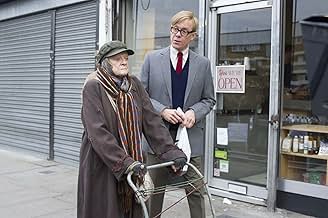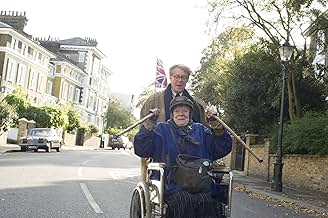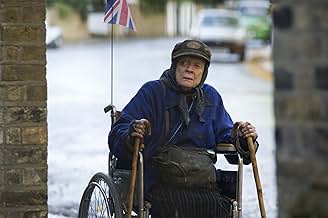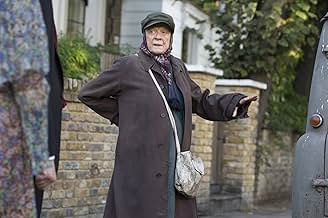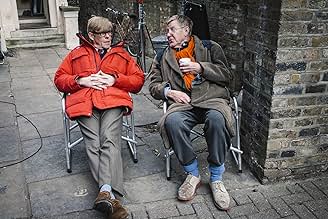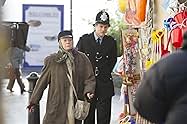VALUTAZIONE IMDb
6,7/10
33.040
LA TUA VALUTAZIONE
Un uomo crea un legame inaspettato con una donna vagabonda che vive nel suo furgone parcheggiato nel suo vialetto.Un uomo crea un legame inaspettato con una donna vagabonda che vive nel suo furgone parcheggiato nel suo vialetto.Un uomo crea un legame inaspettato con una donna vagabonda che vive nel suo furgone parcheggiato nel suo vialetto.
- Nominato ai 1 BAFTA Award
- 1 vittoria e 8 candidature totali
Trama
Lo sapevi?
- QuizThis movie was shot in the actual house on the street where the events took place, Gloucester Crescent in Camden Town. Some of the same people still lived there when the star prop arrived, decades later.
- BlooperMargaret/Mary is shown parking her new Commer van in the drive of Alan Bennett's house and she pulls up on the handbrake in the middle of the van, where a handbrake would normally be. In fact Commer vans had their handbrake to the right of the driver's seat between the seat and the door - not between the two front seats.
- Citazioni
Rufus: Sorry, you can't park here.
Miss Shepherd: No, I've had guidance. This is where it should go.
Rufus: Guidance? Who from?
Miss Shepherd: The Virgin Mary. I spoke to her yesterday. She was outside the post office.
Rufus: What does she know about parking?
- Curiosità sui creditiDuring the first part of the credits, a young Margaret can be seen playing the piano at her concert in King's Hall.
- ConnessioniFeatured in Alan Bennett at 80: Bennett Meets Hytner (2014)
- Colonne sonorePiano Concerto No. 1 In E Minor, OP. 11
Written by Frédéric Chopin
Performed by Clare Hammond and BBC Concert Orchestra
Orchestra Leader Charles Mutter
[The principal piano piece that recurs throughout the film is Chopin's Piano Concerto 1, using both the slow middle (second) movement "romanza" and the quick final (third) movement "rondo". Alfred Cortot was especially associated with playing Chopin's piano oeuvre.]
Recensione in evidenza
"The Lady in the Van"
I added this movie to my watch-list months ago, as soon as I saw the premise and Maggie's name in it's description. Just watched it. And it's EXACTLY what I expected it to be. :)
The plot: (without spoilers)
It's a poignant portrayal of a homeless woman who finds shelter when a lonely writer out of his timidness (don't confuse it with politeness, although being England, timid is good, too) lets her park her van in his driveway. Their bond, which was supposed to end within a few months, lasts almost 15 years.
The review: (without spoilers)
From the starting, you'll be hooked to the character of Maggie Smith, thanks to her glorious acting and the delightful character, Mary/Margaret/Miss Sheperd, she brings life to. Alex Jennings, who plays Alan, the man who lets her stay in her driveway, is quite a delightful actor himself. I don't think I've seen him in any other flicks. Yet.
Regardless to say, the acting is superb. The plot is adorable and heartbreaking, both at the same time. It's a perfect little drama movie with loads of charming humor, mainly delivered by Maggie. Yes, it gets a bit, as the other reviewers have put it, "dull" in the second half, but I think it's perfectly fine, because going in halfway, I expected nothing else. By the time it ended, there was a sense of contentedness in my heart. Also, it had stopped raining, not that THAT matters! :P
In short, this movie is a perfect, "bundle of joy".
I give it: 7.5/10
Also, I have noticed most of the British flicks go unnoticed, here on IMDb. I really wonder why. I have been tracking this one here for months and still it has only 10K or so votes and a lower rating than it deserves. Anyway, I hope this review will attract more viewers? I don't know, but one CAN hope.
That's it for now folks! :)
I added this movie to my watch-list months ago, as soon as I saw the premise and Maggie's name in it's description. Just watched it. And it's EXACTLY what I expected it to be. :)
The plot: (without spoilers)
It's a poignant portrayal of a homeless woman who finds shelter when a lonely writer out of his timidness (don't confuse it with politeness, although being England, timid is good, too) lets her park her van in his driveway. Their bond, which was supposed to end within a few months, lasts almost 15 years.
The review: (without spoilers)
From the starting, you'll be hooked to the character of Maggie Smith, thanks to her glorious acting and the delightful character, Mary/Margaret/Miss Sheperd, she brings life to. Alex Jennings, who plays Alan, the man who lets her stay in her driveway, is quite a delightful actor himself. I don't think I've seen him in any other flicks. Yet.
Regardless to say, the acting is superb. The plot is adorable and heartbreaking, both at the same time. It's a perfect little drama movie with loads of charming humor, mainly delivered by Maggie. Yes, it gets a bit, as the other reviewers have put it, "dull" in the second half, but I think it's perfectly fine, because going in halfway, I expected nothing else. By the time it ended, there was a sense of contentedness in my heart. Also, it had stopped raining, not that THAT matters! :P
In short, this movie is a perfect, "bundle of joy".
I give it: 7.5/10
Also, I have noticed most of the British flicks go unnoticed, here on IMDb. I really wonder why. I have been tracking this one here for months and still it has only 10K or so votes and a lower rating than it deserves. Anyway, I hope this review will attract more viewers? I don't know, but one CAN hope.
That's it for now folks! :)
- nikhil_kamra
- 13 lug 2016
- Permalink
I più visti
Accedi per valutare e creare un elenco di titoli salvati per ottenere consigli personalizzati
- How long is The Lady in the Van?Powered by Alexa
Dettagli
- Data di uscita
- Paesi di origine
- Sito ufficiale
- Lingue
- Celebre anche come
- Lady in the Van
- Luoghi delle riprese
- 23 Gloucester Crescent, London, Greater London, Inghilterra, Regno Unito(Alan Bennett's house where the events actually occurred)
- Aziende produttrici
- Vedi altri crediti dell’azienda su IMDbPro
Botteghino
- Budget
- 6.000.000 USD (previsto)
- Lordo Stati Uniti e Canada
- 10.021.175 USD
- Lordo in tutto il mondo
- 41.387.687 USD
- Tempo di esecuzione1 ora 44 minuti
- Colore
- Mix di suoni
- Proporzioni
- 1.85 : 1
Contribuisci a questa pagina
Suggerisci una modifica o aggiungi i contenuti mancanti

Divario superiore
By what name was The Lady in the Van (2015) officially released in India in Hindi?
Rispondi






